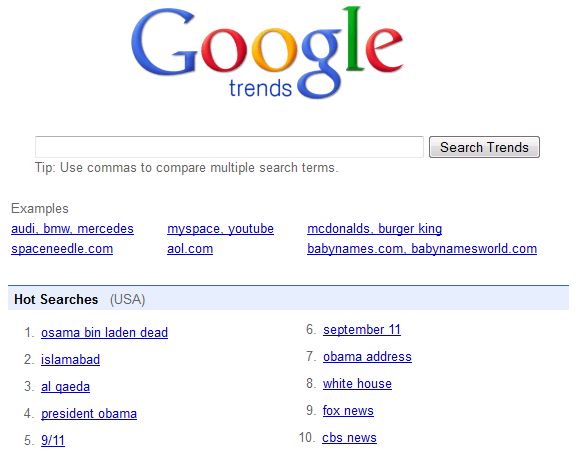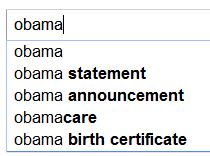If you think about it, the convergence of search and social media is a natural and logical process: not only can social data be used to personalize search results, but social activity (such as Facebook Likes and Twitter tweets) provide crowdsourced indicators of what content is popular with actual users. It's no wonder, then, that a lot has happened in the last year or so to "socialize" search engine result pages (SERPs).
For starters, in addition to including social content from Twitter, Flickr, and other sites into its SERPs, Google recently launched Google +1, allowing users to vote for pages and search results. Also, earlier this year Bing expanded its deal with Facebook, allowing it to both personalize search results and use Facebook Likes to gauge the authority of pages.
So what does this mean for your search engine optimization (SEO) strategy? Well, it means that you should be looking at new ways of using social media to boost your rankings.
Traditional onsite SEO and backlinks are still fundamental. But if you really want to get competitive with your SEO strategy, you need to send search engines the right "social signals" that your site and pages deserve to rank well.
1. Getting Tweeted to Rank
One aspect of your backlink profile that search engines monitor is age. While old backlinks carried tenure, new backlinks demonstrate that your site/page continues to be popular.
Well, tweets serve a similar function by sending "social signals" that a site/page is currently popular. Both Google and Bing have confirmed that social signals impact rankings.
So part of a social SEO strategy should be a Twitter-outreach campaign to get your content tweeted and retweeted. And, ideally, those Tweets should contain the keywords that you're trying to rank for.
2. Socializing Your Content Strategy
Granted, it can be challenging (or impossible) to get your product pages tweeted at a significant volume (unless they end up the butt of a trending meme). So you will need to modify your content strategy by producing content:
3. Influence Through Influencers
Having your content tweetable content is just the first step. You will also want to get tweeted by "influencers" because these are the users who are most likely to get retweeted.
When both Google and Bing confirmed that tweets count toward rankings, they both also indicated that they look at the social authority of the user's Twitter account. Getting tweeted by a user with a lot of followers (and many more than people they follow back) carries considerably more weight than being Tweeted by a handful or slew of "Joe Blows."
Furthermore, influencers are more likely to get retweeted, which means they can offer you more tweets for your buck. So you should look at ways to reach influencers and build relationships with them.
This way, when you do produce (keyword sensitive) "social content," you'll be that much more likely to have that content picked up by an influencer and (potentially) widely Retweeted.
As one example, a few months ago, when Smashing Magazine tweeted about SEOmoz's "Beginner's Guide to SEO" (resulting in countless retweets), SEOmoz began to rank on the first page for just "Beginner's Guide." This is because they had a page optimized for "Beginner's Guide" that got tweeted by an influencer whose Tweet contained the keywords "Beginner's Guide" and got widely retweeted.
4. Be Likeable

Through Bing's exclusive deal with Facebook, Bing can factor Likes into its ranking algorithm, and personalize search results according to whether a user's Facebook friends have Liked something.
This gives Bing a bit of a social edge over Google because Google doesn't have direct access to Facebook data. But Google does factor Facebook Likes and shares into its SERPs, and SEOmoz speculates that shares carry more weight than Likes.
Google is also working to catch up to Bing with the Google +1 button. Through Google's +1 feature, users are able to "vote up" content or search results in a fashion that's similar to Facebook's Like button.
These +1s, moreover, will soon be used to personalize search results based on whether any of your Google contacts have "recommended" a page or site via +1. Granted, it's too early to be sure how heavily +1 will factor into rankings, but Google's intention to crowd-source relevance and personalization is clear and present.
So a big part of socializing your rankings is by being "likeable." This should start with your social content strategy, but it will also involve having awesome products. After all, it's those products that you want to show up in the SERPs.
This is where user-experience and A/B testing will come in. First, you'll want make sure that there are Like/Tweet/+1 buttons on all your pages. But you'll want to play around with different layouts to determine what placements result in the most Tweets/Likes/+1s.
5. Diversify the Communities You Target
While going after the major "social signals" (Facebook, Twitter and possibly +1) is a no-brainer, you should also take your social SEO strategy beyond the fishbowl. Specifically, there are a number of social content communities that also offer a significant opportunity to get valuable backlinks and drive traffic (that may also result in additional tweets/Likes/+1s).
Diversifying your traffic sources is important in SEO. Your SEO strategy should aim to get links and traffic from as many sources as possible. Reddit, StumbleUpon, and Digg all represent significant opportunities for to get both.
This is where your social content strategy becomes even more important. Specifically, when targeting these communities, you'll have to reconcile your brand's messaging with the culture of these communities.
This means producing branded content that:
Once you produce content that reconciles your brand with what these communities like, you'll have to actually seed you content across these content sharing sites.
Again, you'll need to access "influencers" within communities. That means investing in building and maintaining relationships beyond Twitter -- or partnering with someone who already has.
6. Build a Brand That Ranks
The days of resting your SEO on a keyword targeted domain name may soon be over. Search engines appear to be giving established and trusted brands the benefit of the doubt when it comes to search rankings.
For example, one of the reasons that it took Google so long to penalize JCPenney and Overstock.com was that both were major brands that were trusted by both consumers. Consequently, Google gave them the benefit of the doubt when it came when it came to suspicious backlink profiles.
Once that trust had been violated, however, their brands couldn't save them from tumbling down the rankings. But it does go to show just how far brand trust can go when it comes to search rankings.
Granted, building a trusted brand is something that takes time and money. Even if you launch a multimillion-dollar national ad campaign, you won't going to gain the trust of consumers and Google overnight. But that's all the more reason to start looking at ways that you can build your brand up as much as possible (at least within your industry).
Consider starting with an extensive social media presence where you interact with consumers on a frequent and consistent level. Your social content strategy will support you here, but you might also try more sponsored alternatives, such as Facebook Ads and running contests.
From there, you might step up your game through some kind of online of offline publicity stunt. In other words, once you get users talking about your content, look at how you might be to get them talking about you, whether it's through news mentions or stirring up community buzz around your brand or products.
Source: http://searchenginewatch.com/3642303
For starters, in addition to including social content from Twitter, Flickr, and other sites into its SERPs, Google recently launched Google +1, allowing users to vote for pages and search results. Also, earlier this year Bing expanded its deal with Facebook, allowing it to both personalize search results and use Facebook Likes to gauge the authority of pages.
So what does this mean for your search engine optimization (SEO) strategy? Well, it means that you should be looking at new ways of using social media to boost your rankings.
Traditional onsite SEO and backlinks are still fundamental. But if you really want to get competitive with your SEO strategy, you need to send search engines the right "social signals" that your site and pages deserve to rank well.
1. Getting Tweeted to Rank
One aspect of your backlink profile that search engines monitor is age. While old backlinks carried tenure, new backlinks demonstrate that your site/page continues to be popular.
Well, tweets serve a similar function by sending "social signals" that a site/page is currently popular. Both Google and Bing have confirmed that social signals impact rankings.
So part of a social SEO strategy should be a Twitter-outreach campaign to get your content tweeted and retweeted. And, ideally, those Tweets should contain the keywords that you're trying to rank for.
2. Socializing Your Content Strategy
Granted, it can be challenging (or impossible) to get your product pages tweeted at a significant volume (unless they end up the butt of a trending meme). So you will need to modify your content strategy by producing content:
For example, it's great to have a blog post about the 10 fastest cars in the world go viral on Twitter. But the tweets that result from it would be more valuable if you sell auto parts/accessories than if you sell evening wear.
- That has the potential to go viral, at least within niche communities relevant to you industry. Go beyond the run-of-the-mill press release or "look at us" blog post and produce content that your target market will find helpful or entertaining -- the kind of stuff that users will be likely to share via Twitter (and other channels).
- Around or related to the keyword themes you're trying to rank on. The reason you want to do this is because you want Tweets and Retweets to include those keywords.
3. Influence Through Influencers
Having your content tweetable content is just the first step. You will also want to get tweeted by "influencers" because these are the users who are most likely to get retweeted.
When both Google and Bing confirmed that tweets count toward rankings, they both also indicated that they look at the social authority of the user's Twitter account. Getting tweeted by a user with a lot of followers (and many more than people they follow back) carries considerably more weight than being Tweeted by a handful or slew of "Joe Blows."
Furthermore, influencers are more likely to get retweeted, which means they can offer you more tweets for your buck. So you should look at ways to reach influencers and build relationships with them.
This way, when you do produce (keyword sensitive) "social content," you'll be that much more likely to have that content picked up by an influencer and (potentially) widely Retweeted.
As one example, a few months ago, when Smashing Magazine tweeted about SEOmoz's "Beginner's Guide to SEO" (resulting in countless retweets), SEOmoz began to rank on the first page for just "Beginner's Guide." This is because they had a page optimized for "Beginner's Guide" that got tweeted by an influencer whose Tweet contained the keywords "Beginner's Guide" and got widely retweeted.
4. Be Likeable

Through Bing's exclusive deal with Facebook, Bing can factor Likes into its ranking algorithm, and personalize search results according to whether a user's Facebook friends have Liked something.
This gives Bing a bit of a social edge over Google because Google doesn't have direct access to Facebook data. But Google does factor Facebook Likes and shares into its SERPs, and SEOmoz speculates that shares carry more weight than Likes.
Google is also working to catch up to Bing with the Google +1 button. Through Google's +1 feature, users are able to "vote up" content or search results in a fashion that's similar to Facebook's Like button.
These +1s, moreover, will soon be used to personalize search results based on whether any of your Google contacts have "recommended" a page or site via +1. Granted, it's too early to be sure how heavily +1 will factor into rankings, but Google's intention to crowd-source relevance and personalization is clear and present.
So a big part of socializing your rankings is by being "likeable." This should start with your social content strategy, but it will also involve having awesome products. After all, it's those products that you want to show up in the SERPs.
This is where user-experience and A/B testing will come in. First, you'll want make sure that there are Like/Tweet/+1 buttons on all your pages. But you'll want to play around with different layouts to determine what placements result in the most Tweets/Likes/+1s.
5. Diversify the Communities You Target
While going after the major "social signals" (Facebook, Twitter and possibly +1) is a no-brainer, you should also take your social SEO strategy beyond the fishbowl. Specifically, there are a number of social content communities that also offer a significant opportunity to get valuable backlinks and drive traffic (that may also result in additional tweets/Likes/+1s).
Diversifying your traffic sources is important in SEO. Your SEO strategy should aim to get links and traffic from as many sources as possible. Reddit, StumbleUpon, and Digg all represent significant opportunities for to get both.
This is where your social content strategy becomes even more important. Specifically, when targeting these communities, you'll have to reconcile your brand's messaging with the culture of these communities.
This means producing branded content that:
One company that does this well is Rackspace with the infographics they produce. But you can also achieve this with Top 5/10 lists.
- Is interesting, engaging, and entertaining -- or any two out of these three.
- Has nothing to do with the products/services you sell.
- Is still somehow on topic in terms of the keywords you're trying to rank for.
Once you produce content that reconciles your brand with what these communities like, you'll have to actually seed you content across these content sharing sites.
Again, you'll need to access "influencers" within communities. That means investing in building and maintaining relationships beyond Twitter -- or partnering with someone who already has.
6. Build a Brand That Ranks
The days of resting your SEO on a keyword targeted domain name may soon be over. Search engines appear to be giving established and trusted brands the benefit of the doubt when it comes to search rankings.
For example, one of the reasons that it took Google so long to penalize JCPenney and Overstock.com was that both were major brands that were trusted by both consumers. Consequently, Google gave them the benefit of the doubt when it came when it came to suspicious backlink profiles.
Once that trust had been violated, however, their brands couldn't save them from tumbling down the rankings. But it does go to show just how far brand trust can go when it comes to search rankings.
Granted, building a trusted brand is something that takes time and money. Even if you launch a multimillion-dollar national ad campaign, you won't going to gain the trust of consumers and Google overnight. But that's all the more reason to start looking at ways that you can build your brand up as much as possible (at least within your industry).
Consider starting with an extensive social media presence where you interact with consumers on a frequent and consistent level. Your social content strategy will support you here, but you might also try more sponsored alternatives, such as Facebook Ads and running contests.
From there, you might step up your game through some kind of online of offline publicity stunt. In other words, once you get users talking about your content, look at how you might be to get them talking about you, whether it's through news mentions or stirring up community buzz around your brand or products.
Source: http://searchenginewatch.com/3642303












